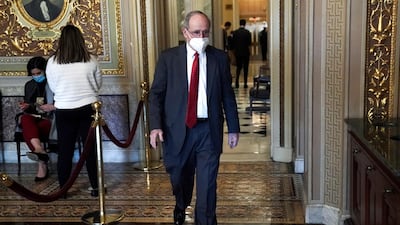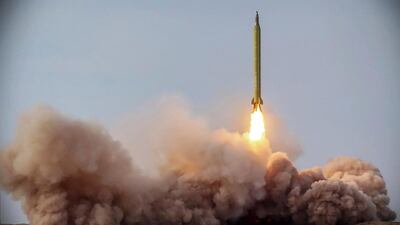James Risch, the top Republican on the Senate Foreign Relations Committee, is urging the Biden administration to “show some muscle” against Iran after renewed rocket attacks on US forces in Iraq. He said he was “disappointed with the start of the administration".
Like its predecessors, the Biden administration has indicated that it wants to focus more on great-power competition with Russia and China, but Mr Risch said in an interview with The National on Tuesday that the US should maintain an assertive posture in the Middle East to counter Iran.
"Historically, if you do turn your attention away from the Middle East, it's going to cause you problems in the future," Mr Risch said. "I don't view this as an either-or – I think both need our attention."
Mr Risch said the Biden administration should not have engaged in negotiations after last week's rocket attacks in Erbil, saying that the White House should instead be preparing for the possibility of an Israeli strike on Iran.
He also pushed back against public reports estimating that Iran's breakout time to build a nuclear weapon could be as low as three and a half months – a figure first mentioned by former UN weapons inspector David Albright in November. Mr Risch said that the figure, cited by Secretary of State Antony Blinken during his confirmation hearing in January, "is not accurate".
The following interview was lightly edited for brevity and clarity.
One of the big things that the Biden administration seems to want to do, as have previous administrations – both presidents Trump and Obama – is put more emphasis on East Asia and try to extract the United States from Middle Eastern military quagmires. Can I get your perspective on how the focus on great-power competition will affect US posture and engagement in the Middle East?
Mr Risch: Well, first of I all, I was kind of stunned when the last administration said they were going to recalibrate – turn our attention to Asia. We're a country that can walk and chew gum at the same time. There are issues in both regions that need our attention, and I don't think it's appropriate to say we're going to shift our attention from one to the other.
Certainly, one or the other may be getting more attention from us, but that doesn’t mean by any means that we would turn away or reduce our involvement or our interest in the Middle East. Historically, if you do turn your attention away from the Middle East, it’s going to cause you problems in the future. I don’t view this as an either-or – I think both need our attention.
The prior administration was tolerant with Iran for longer than it should have been and finally did something about it. And it changed the landscape dramatically. Now we're just gazing towards a new administration and Iran's testing. Obviously, a week ago today, they dropped 14 missiles on one of our facilities in Iraq, in Erbil. The administration responded three days later by telling them they were going to sit down and renegotiate. Iran responded by announcing this weekend that they were going to start enriching considerably more [uranium] than they were. This is nonsense. I'm disappointed with the start of the administration.
With the Iranians, we’ve learnt over and over and over again how to deal with them, and it isn’t by making nice. They don’t understand that. Not only don’t they understand that, they don’t want to do that. They understand power. When we took [Gen Qassem] Suleimani out, they understood that and things went quiet. I’m hoping they’re going to start to show some muscle as opposed to turning the other cheek.

What do you think the appropriate response from the Biden administration should be? If you had a direct line to President Joe Biden and told him what he should do, what would you tell him?
Mr Risch: I do have a direct line and I will tell him, but I'm not going to tell you – any more than I did with [former] president Trump. We had a relationship where we could argue about these things and discuss them and try to come to a conclusion. This is not a political thing. These kinds of issues, particularly the Iran issue, is not a political matter.
Another place Iran is very involved in is Yemen with the Houthi rebels. You called for the Biden administration to repeal the foreign terrorist designation on the Houthis, which they did. But you also said there needs to be more pressure on the Houthis. As we see them continue their offensive against Marib, which the Biden administration has warned against, what does that pressure against the Houthis look like, absent the terrorist designation?
Mr Risch: Hanging over the Houthis' head, always, is our engagement as far as the Saudis are concerned. Everybody in the world, with the exception of the Houthis and the Iranians, want this thing over with. I talk to the Saudis regularly. They don't want to be there. They don't want any part of this, but they have no choice. So long as the Houthis continue doing what they're doing to the Saudis, this is going to go on.
The administration is going to have to continue to pressure the Houthis, and there are ways we can do that, which hopefully they will understand. But again, this is all about Iran. If Iran walked away from this thing, it would be over tomorrow. But they won’t because they are anarchists and like these proxy kind of things. And we’re going to have to deal with this.
Iran’s nuclear breakout time is approximately three months. When the US remained in the nuclear deal, it was approximately one year. Can you respond to the argument that the nuclear deal was good because the breakout time was longer?
Mr Risch: The breakout time that you are citing right now, I'm not sure where that comes from. I sat on the intelligence committee, I deal regularly with the Israelis. That three months number is not accurate.
But set that aside, the question is where do we go from here, what do we do here? And my complaint with the nuclear deal is not focused strictly on the nuclear part of it. That’s where they got in trouble.
That’s where I argued with John Kerry, who refused to do anything but talk about the nuclear part of this. I said, John, you can’t do this. This is one aspect to misconduct that the Iranians are involved in. And they’ve got at least half a dozen different areas where they’ve got to change their ways or there’s going to be serious consequences. And he declined to engage in that argument and said, nope, all we’re going to do is the nuclear. And everything I suggested, he said 'they won’t go for that'.
Believe me, I’d love to see that agreement with the Iranians. But you need two things if you’re going to do that. Number one, you need a common objective. And number two, you need to have parties on both sides acting in good faith. You have neither when you’re interacting with the Iranians. And as long as that exists, it’s going to be very elusive as far as a deal is concerned.
As you know, the Biden administration announced they're going to start talking again to the Iranians. You saw how they responded to that: with arrogance and without the humility that you need to get into these agreements. I'm not optimistic, at the end of the day.
What all these people need to be talking about is what they’re going to do when the Israelis decide to do something about this, because we can make any agreement we want with the Iranians. But if the Israelis determine that a point has been crossed in which they need to do something about the Iranians developing a nuclear weapon, they are going to do something. And people need to be answering the question, what are you going to do when you get that phone call?
Now that the UAE, Bahrain, Sudan and Morocco signed on to the Abraham Accord, what’s the future direction for normalisation with Israel in the Arab world? Are there any countries you hope would sign on soon?
Mr Risch: I would hope that every Arab country would sign on. Obviously, there's at least one population that wouldn't sign on. In talking with the Arabs on this, they were very optimistic about it. They speak glowingly of it. The ones who have entered into this did not enter into it reluctantly. They're embracing it and they want them to succeed. The ones that haven't talked about entering at some point in the future and would like to, but obviously each country has its own issues that drive whether they can or can't do that, be it domestic politics or whatever. I think these things, these accords are a huge step forward. They're historical. I don't think they've been highlighted as much as they should because of their significance, but I'm very optimistic, looking forward with the Abraham Accord.
In the last Congress, when you were chairman of the committee, you were working with [New Jersey senator] Robert Menendez on a Turkey sanctions bill. Obviously, the S-400 is still an issue, there are still issues with Turkey and the Kurds in Syria. At this point, do you think the US-Turkish alliance should be salvaged or scrapped?
Mr Risch: I would really hope that the relationship with Turkey does not get scrapped. They're a Nato ally. They've been a great friend to the United States and a good ally for many, many years. Under [Recep Tayyip] Erdogan's leadership, that has deteriorated dramatically. I have spoken numerous times with Turkish officials and once with Mr Erdogan himself in person. And I have to tell you after my conversations with Mr Erdogan that I'm simply not optimistic that he's going to do what he needs to do in order to rehabilitate the relationship.
It absolutely astounded me that he turned around to buy those S-400 missiles. His statement to me was the same as the other officials I dealt with previously. They told me they had to buy them because we wouldn't sell them the Patriot [missiles]. At which point, I sent him a letter signed by myself and [New Hampshire senator Jeanne] Shaheen which we delivered to the foreign minister in Ankara in October of 2012, when they were shopping for these things. Buy them from us. We are willing to sell you as many as you want to buy. They're a good product, let us know what you want.
And they didn't. They turned around and bought S-400s. Their argument that they had to buy those is absolutely false. I know it for a fact because I was involved in inviting them to purchase the Patriots. The other thing I explained to them is that they can't be involved in the F-35 programme and they can't have F-35s as long as there's a Russian S-400 missile in the country. And they absolutely reject that, and the result of that is I reject their rejection and I'm not signing off on the F-35s that they've paid for. They're here in the United States waiting to be delivered.
The long and short of it is, they’re headed in the wrong direction. I don’t think under Mr Erdogan that that’s going to turn around. But we are ready and willing and able to take Turkey back with open arms if they will do what they’ve always done in the past, and that is treat us as a friendly and trusted ally.




